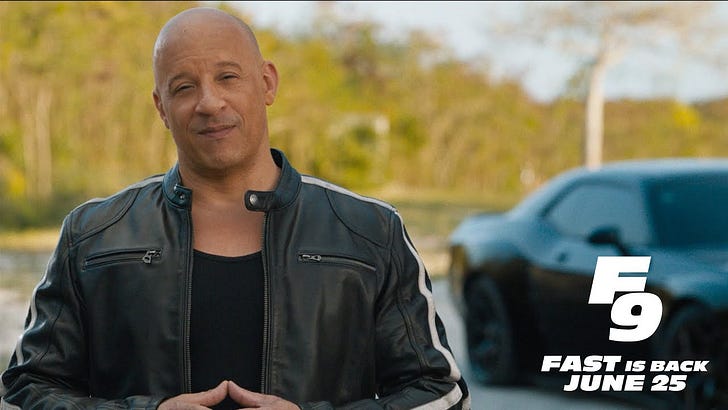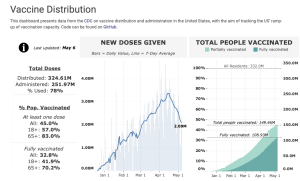(Going forward, I’ll be sending my weekly column on the most important story in entertainment to this newsletter list as well as my weekly streaming ratings report.
Also, for some reason, last week’s streaming ratings report “What A Difference A Covid Year Makes in the Ratings” was published, but didn’t deliver via email. Click on the link to read it.)
Two and a half months back, I made a bold call. Looking at the pace of vaccinations, the growth of that growth and the incredible effectiveness of vaccines, I said, “By May, theaters will be back!”
Since the only thing more valuable than making predictions is checking to see if they were right, given that May 7th was the day Black Widow was supposed to debut in theaters, it’s worth checking back on that prediction. And while we’re at it, why not check in on theaters in general? That’s really the most important question/story this week: will theaters survive Covid-19?
Most Important Story of the Week - Can Theaters Still Survive Covid-19?
Really, a number of headlines were vying for my attention this week from the doom (“Sony Sells Cinderella to Amazon Prime Video!”) to the boom (“Netflix Puts Army of the Dead in Theaters for One Week!”). So instead of picking one, I picked them all. There isn’t one headline I’m covering today, but a host of headlines I’ve been collecting for the last few weeks.
Consider this my more measured (and moderate) take on the shape of film distribution to come. We'll look at a few big buckets, everything from Covid-19 to theatrical to studio calendars to windowing in general, looking at the good and bad news of each.
Covid-19
The headlines:
- Good News: Covid vaccinations in the US have passed 50% of adults.
- Bad News: The pace of vaccinations has declined sharply.
- Good News: US cases, infection rate, hospitalizations and deaths are declining.
- Bad News: The rest of the world isn’t on those same trend lines.
Overall, the state of the pandemic in the United States is mostly one under control. You wouldn’t know this from most of the headlines from the last few months, warning of spikes, variants or even “impending doom” but the inexorable pace of US vaccinations has mostly turned the last “wave” into a small bump. Even states that saw a recent rise in cases are mostly seeing a crest. Here’s just one look at cases:
For all the gains made by Israel, the UK and the US, quite a few other countries are lagging, including the EU. (China, the second biggest market after the US, has had the virus under control for months now.) Worse, other countries are seeing tsunamis of Covid-19, like India and Brazil. Truly, this is truly a global pandemic.
The last good news is that vaccine production globally is also increasing, and countries with extra doses (like the US) are planning on giving those away. Just this week the US ended patent protection on Covid-19 vaccines, which could drastically improve global production.
Theaters
The Headlines...
- Good News: Godzilla vs Kong beat expectation and earned $48.5 Million at the box office in its first 5 Days
- Good News; Mortal Kombat beat expectations and earned $22.5 Million at the box office
- Bad News: Films Aren’t Sustaining Past Their Opening Weekends
- Bad News: The Arclight/Pacific Theaters Closed
When you think just from the theaters perspective, the last few weeks have been surprisingly positive for theaters. Godzilla vs Kong set new Covid-19 records and then Mortal Kombat beat expectations. In each case, more people have gone to theaters than folks would expect. That said, most theaters remain at 25-50% capacity and few are back to full capacity given that most states are in some sort of lock down, especially coastal states. This fundamentally reduces upside of the box office each weekend, and theaters are beating expectations given these constraints.
Even the good news is only good given the drastically lowered expectations. When the second biggest film in theaters is a Japanese Manga film earning $19.5 million, then you know we’re in strange times. Moreover, none of these films has actually passed the $100 million mark at the domestic box office, which used to be the bare minimum for success.
I’ve called everything since March 2020 the “Covid Caveat”, meaning we can’t compare it to non-Covid times. The question is how long the “Covid Caveat” lasts. And frankly that means true blockbusters. The next true blockbuster is Fast 9 (scheduled for June 26th) with maybe A Quiet Place II setting new Covid records on Memorial Day weekend. Each week that beats expectations brings us closer to normalcy.
If studios hold to their release schedules...
Studio Releases
The headlines...
- The Bad News: Paramount Sells Multiple Shows and Moves Films
- The Good News: Studios are Worried about a Box Office “Traffic Jam”
- Bad News: Sony Sells Cinderella to Amazon, Vivo to Netflix and More
- The Good News: Fast Nine Began Its Marketing Campaign
The stream of news about films moving around the schedule could support either the “theaters are dead” narrative or the “theaters will be fine” narrative. Take the Sony news. They’ve basically sold straight into streaming anything not buckled down:
Paramount has joined this trend, selling films to Amazon Prime and others. One would be tempted to look at this moves with more doom and gloom for the industry, but as The Hollywood Reporter laid out via this headline, actually the problem is too many films releasing in the fall, not too few:
Since most theaters delayed most of their truly big blockbusters into 2021, and theaters still aren’t fully-open, the back half of the year is packed with blockbuster openings. Meaning each film will have more, tougher competition than in a normal year. And these are in months that don’t normally have tons of blockbusters anyways.
If you want good news, though, take it in the form of this Public Service Announcement cum film trailer for Fast 9. Now that Universal is committed to the end of June via this marketing campaign--and no simultaneous streaming release as of yet--we know when the first true blockbuster will be.
(Apologies for denigrating the Warner releases as not true blockbusters, but you know, they weren’t.)
Windowing
The headlines...
- The Bad News: The HBO Max Films Have Done Very Well in Theaters and on Streaming
- The Good News: Warner Media Will Return to Theaters Next Year
- The Good News: Netflix is Bringing Army of the Dead to Cinemark Theaters
- The Good News: Seriously, Netflix is Bringing films to Theaters?!?!?!?
Surprisingly, the “windowing process”--meaning the arbitrary release pattern of releasing films into theaters, then home entertainment and then to TV/streaming--may have the most good news of all. The bad news for windows (not sure who “windows” are, but presumably theaters/home entertainment) is that the streamers are aggressively shortening every window that isn’t streaming. See Warner Media going day and date. Or Comcast taking the window down to three weeks last year.
When Comcast and Warner Bros announced their plans to shorten or change windows, lots of commentary announced that the window was shattered. Words like “smashed”, “broken”, and “obliterated” were routinely hyperbolically deployed. And yet, the most stringent window in feature films was this:
Netflix will not release films in theaters before their streaming debut on Netflix.
And yet that window too is smashed. Shattered! Obliterated!
Well, not really. Like all other categories, the truth is somewhere in between. First, Netflix is only allowing a theatrical run for one week, which some have said Netflix is willing to let films in theaters, but less than four weeks. Second, both Warner Bros decision to return to regular windows next year and Netflix’s Cinemark deal are also firmly in the “Covid Caveat” time frame. In other words, if Netflix gets Cinemark to put Red Notice in theaters one week early, that will be the truly groundbreaking news. By the fall, Cinemark won’t need Netflix films since they’ll have so much content (films getting six to eight weeks of marketing campaigns). Can Netflix make a deal/marketing commitment in that environment?
The moral seems to be that windows will indeed get shortened, but not abandoned entirely.
The Future?
So Covid is getting better, but slowly. Theaters are reopened, but partially. Studios are planning blockbusters, but not for weeks. Windows are collapsing, but only so far.
There is one profound lesson in this series of headlines: theaters make lots of money. And studios want to get that money.
Subscription economics are great businesses. And Wall Street loves them. But why stop there? If Netflix, Disney or Warner Bros can make lots of money releasing a film on their subscription platform, but could also make a few extra hundred million by releasing it in theaters for a few weeks, why not do both? Especially if releasing it in theaters actually increases the value on streaming later?
Yes, the shattered windows of the pre-Covid world will not return. Waiting ninety days after theaters is too long. But I wouldn’t bet on day-and-date for theaters and streaming either. Too many folks are moving in the opposite direction (meaning at least three to six weeks before home entertainment/streaming) to not see a trend. Making money in streaming is good. But you know what is better? Making more money in theaters and streaming.
My Prediction on Covid-19
How well did my model do on predicting this? Well, over 50% of society has at least one shot (exactly 57% of 18+ population as of this writing), which is little below where the simple linear model thought we’d be. Which, as a reminder, the actual protection is even higher, given that lots of non-vaccinated folks also have protection from previous infections.
As for my more aggressive model--where we would have passed 300 million doses by now--it likely was stymied by the decision to pause Johnson & Johnson, which became the day of peak vaccinations in the US. That decision likely contributed to vaccine hesitancy, as pausing AstraZeneca had previously hurt vaccine uptake in the EU. And the lesson for modelers everywhere is that decisions like that are the unknowns that trip up models.
(And I’m fine telling you what I got right and wrong in these predictions. If someone tells you they predict everything correctly, they’re either being too conservative, or they’re backfitting every prediction, which is useless.)
With hindsight, did Black Widow and Fast 9 make the right calls to move backwards? Probably, if nothing else for the international revenue. As I just said, India, Brazil and EU countries are currently being hammered by Covid-19, so even if the US had returned to normal, global box office would not have. Fast 9 probably could have risked the Memorial Day weekend, but the end of June is much more certain.






